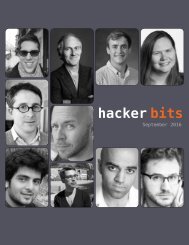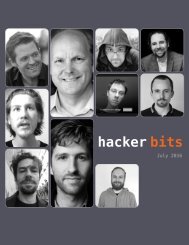Hacker Bits, April 2016
HACKER BITS is the monthly magazine that gives you the hottest technology and startup stories crowdsources by the readers of Hacker News. We select from the top voted stories for you and publish them in an easy-to-read magazine format. Get HACKER BITS delivered to your inbox every month! For more, visit http://hackerbits.com.
HACKER BITS is the monthly magazine that gives you the hottest technology and startup stories crowdsources by the readers of Hacker News. We select from the top voted stories for you and publish them in an easy-to-read magazine format.
Get HACKER BITS delivered to your inbox every month! For more, visit http://hackerbits.com.
You also want an ePaper? Increase the reach of your titles
YUMPU automatically turns print PDFs into web optimized ePapers that Google loves.
In the Macintosh Division,<br />
we had a saying, “A players<br />
hire A players; B players<br />
hire C players” – meaning<br />
that great people hire<br />
great people. On the other<br />
hand, mediocre people hire<br />
candidates who are not as<br />
good as they are, so they<br />
can feel superior to them.<br />
(If you start down this slippery<br />
slope, you’ll soon end<br />
up with Z players; this is<br />
called The Bozo Explosion.<br />
It is followed by The Layoff.)<br />
— Guy Kawasaki<br />
There is an opportunity<br />
cost to keeping someone<br />
when you could do better.<br />
At a startup, that opportunity<br />
cost may be the difference<br />
between success and<br />
failure. Do you give less<br />
than full effort to make<br />
your enterprise a success?<br />
As an entrepreneur, you<br />
sweat blood to succeed.<br />
Shouldn’t you have a team<br />
that performs like you<br />
do? Every person you hire<br />
who is not a top player is<br />
like having a leak in the<br />
hull. Eventually you will<br />
sink. — Jon Soberg<br />
Why am I so hardnosed about this? It’s because it is much,<br />
much better to reject a good candidate than to accept a<br />
bad candidate. A bad candidate will cost a lot of money and<br />
effort and waste other people’s time fixing all their bugs.<br />
Firing someone you hired by mistake can take months and be<br />
nightmarishly difficult, especially if they decide to be litigious<br />
about it. In some situations it may be completely impossible to<br />
fire anyone. Bad employees demoralize the good employees.<br />
And they might be bad programmers but really nice people<br />
or maybe they really need this job, so you can’t bear to fire<br />
them, or you can’t fire them without pissing everybody off, or<br />
whatever. It’s just a bad scene.<br />
On the other hand, if you reject a good candidate, I mean, I<br />
guess in some existential sense an injustice has been done,<br />
but, hey, if they’re so smart, don’t worry, they’ll get lots of<br />
good job offers. Don’t be afraid that you’re going to reject<br />
too many people and you won’t be able to find anyone to hire.<br />
During the interview, it’s not your problem. Of course, it’s<br />
important to seek out good candidates. But once you’re actually<br />
interviewing someone, pretend that you’ve got 900 more<br />
people lined up outside the door. Don’t lower your standards<br />
no matter how hard it seems to find those great candidates.<br />
— Joel Spolsky<br />
It is better to reject a good<br />
applicant every single time than<br />
accidentally accept one single<br />
mediocre applicant.<br />
8 hacker bits















